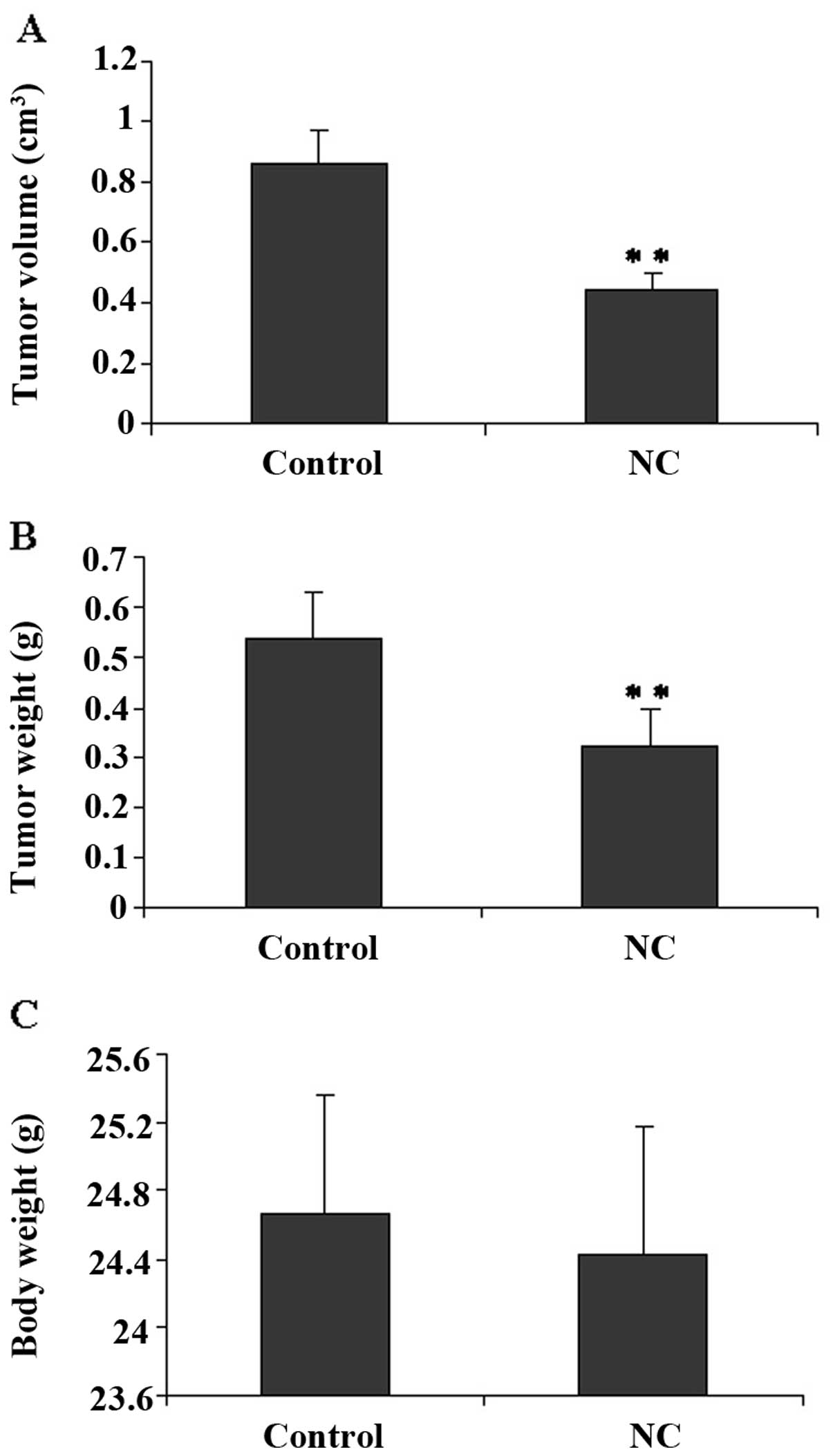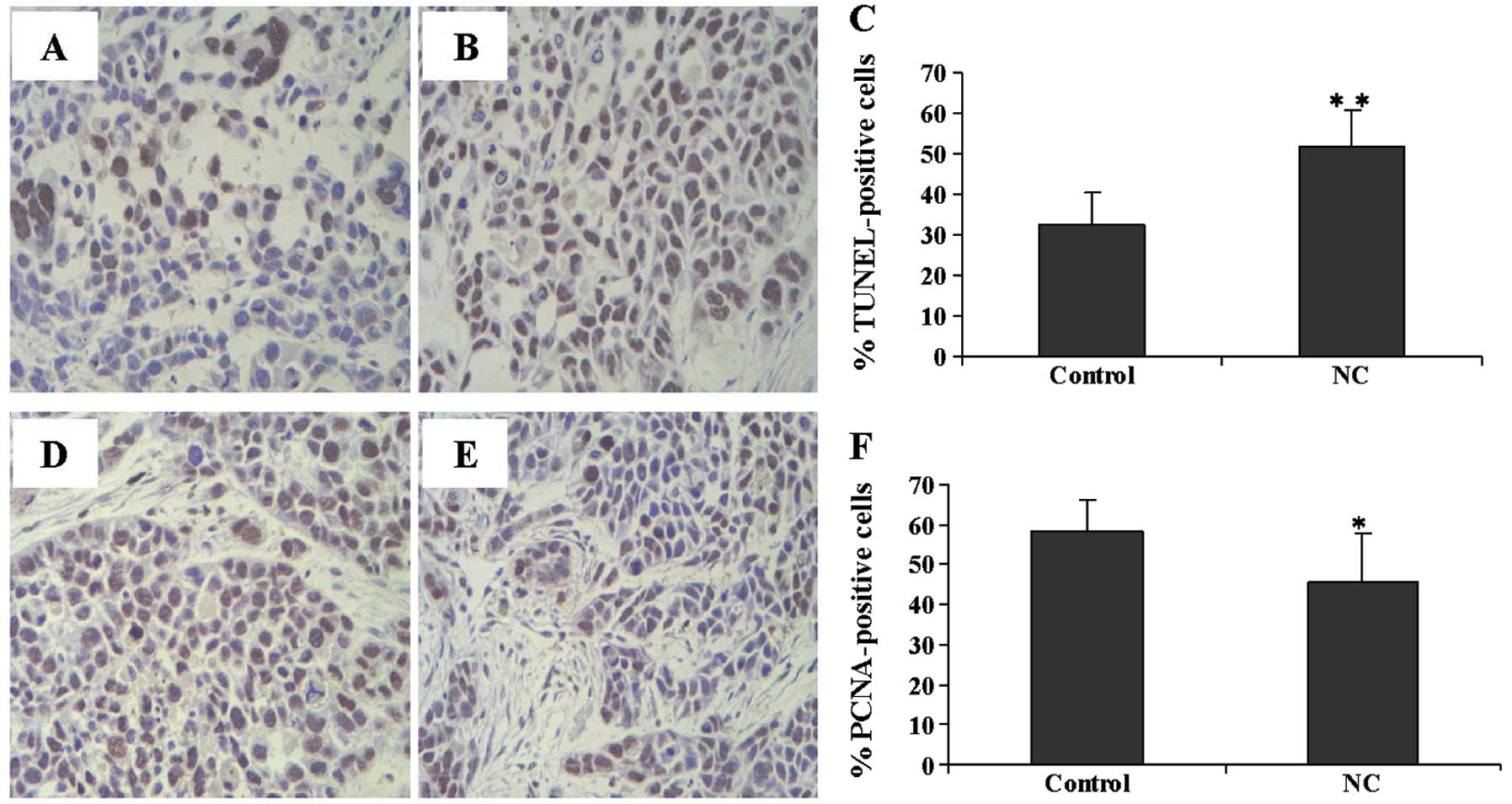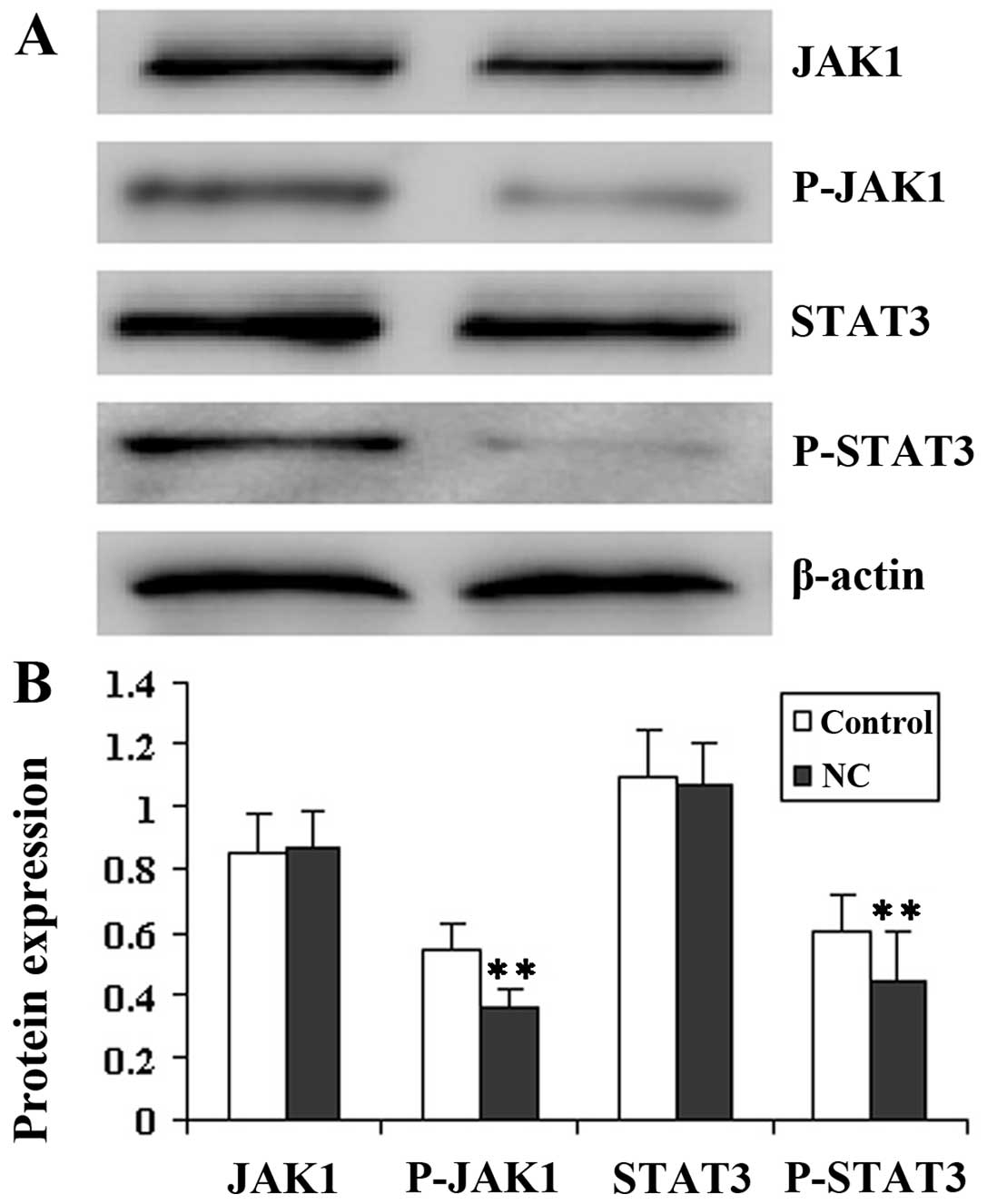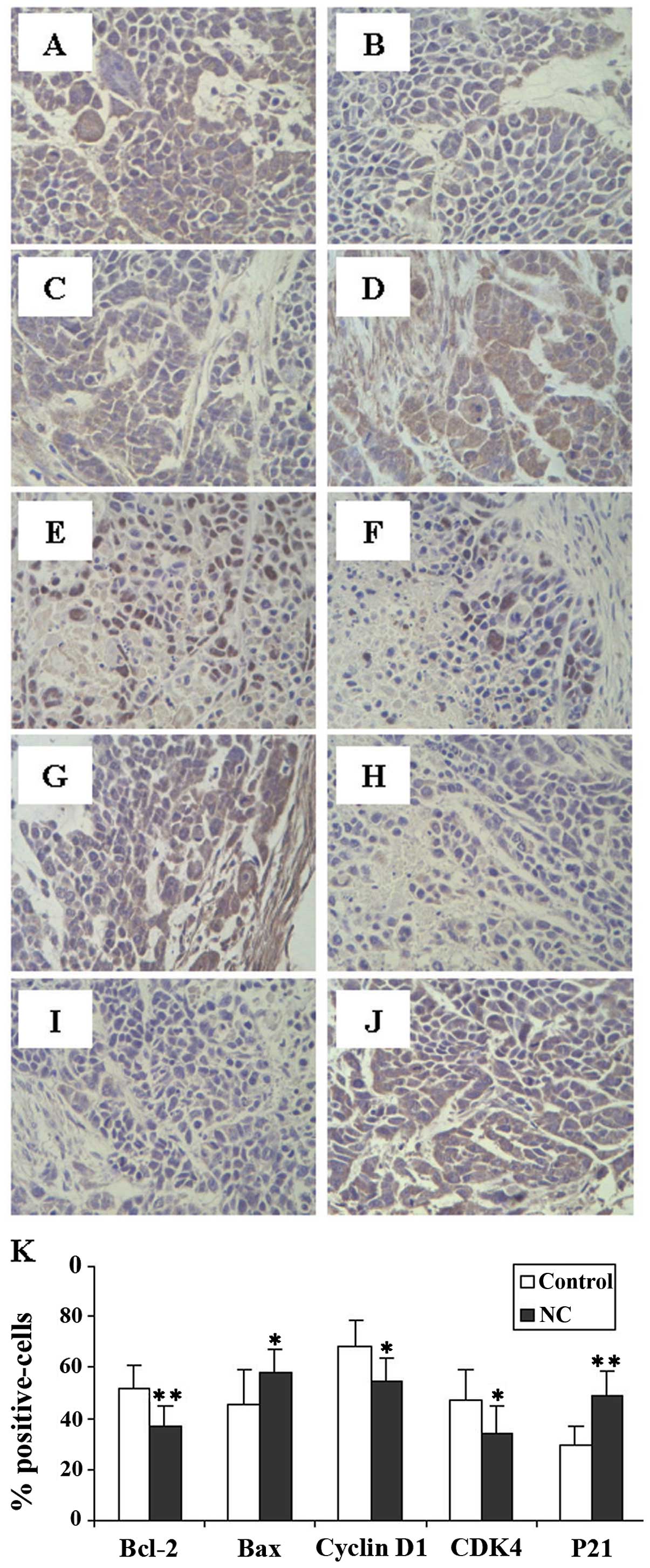|
1.
|
Ferenci P, Fried M, Labrecque D, et al:
Hepatocellular carcinoma (HCC): a global perspective. J Clin
Gastroenterol. 44:239–245. 2010. View Article : Google Scholar : PubMed/NCBI
|
|
2.
|
Cheng AL, Kang YK, Chen Z, et al: Efficacy
and safety of sorafenib in patients in the Asia-Pacific region with
advanced hepatocellular carcinoma: a phase III randomised,
double-blind, placebo-controlled trial. Lancet Oncol. 10:25–34.
2009. View Article : Google Scholar
|
|
3.
|
Bridges JF, Dong L, Gallego G, Blauvelt
BM, Joy SM and Pawlik TM: Prioritizing strategies for comprehensive
liver cancer control in Asia: a conjoint analysis. BMC Health Serv
Res. 12:3762012. View Article : Google Scholar : PubMed/NCBI
|
|
4.
|
Wörns MA and Galle PR: Future perspectives
in hepatocellular carcinoma. Dig Liver Dis. 42(Suppl 3): S302–S309.
2010.
|
|
5.
|
Jemal A, Bray F, Center MM, Ferlay J, Ward
E and Forman D: Global cancer statistics. CA Cancer J Clin.
61:69–90. 2011. View Article : Google Scholar
|
|
6.
|
Bruix J, Sherman M, Llovet JM, et al:
Clinical management of hepatocellular carcinoma. Conclusions of the
Barcelona-2000 EASL conference. European Association for the Study
of the Liver. J Hepatol. 35:421–430. 2001. View Article : Google Scholar : PubMed/NCBI
|
|
7.
|
Levin B and Amos C: Therapy of
unresectable hepatocellular carcinoma. N Engl J Med. 332:1294–1296.
1995. View Article : Google Scholar : PubMed/NCBI
|
|
8.
|
Abou-Alfa GK, Huitzil-Melendez F-D,
O’Reilly EM and Saltz LB: Current management of advanced
hepatocellular carcinoma. Gastrointest Cancer Res. 2:64–70.
2008.PubMed/NCBI
|
|
9.
|
Boos G and Stopper H: Genotoxicity of
several clinically used topoisomerase II inhibitors. Toxicol Lett.
116:7–16. 2000. View Article : Google Scholar : PubMed/NCBI
|
|
10.
|
Auyeung KK and Ko JK: Coptis
chinensis inhibits hepatocellular carcinoma cell growth through
nonsteroidal anti-inflammatory drug-activated gene activation. Int
J Mol Med. 24:571–577. 2009.
|
|
11.
|
Gordaliza M: Natural products as leads to
anticancer drugs. Clin Transl Oncol. 9:767–776. 2007. View Article : Google Scholar : PubMed/NCBI
|
|
12.
|
Newman DJ, Cragg GM and Snader KM: The
influence of natural products upon drug discovery. Nat Prod Rep.
17:215–234. 2000. View
Article : Google Scholar : PubMed/NCBI
|
|
13.
|
Yamaoka K, Saharinen P, Pesu M, Holt VE
III, Silvennoinen O and O’Shea JJ: The Janus kinases (Jaks). Genome
Biol. 5:2532004. View Article : Google Scholar : PubMed/NCBI
|
|
14.
|
Aaronson DS and Horvath CM: A road map for
those who don’t know JAK-STAT. Science. 296:1653–1655. 2002.
|
|
15.
|
O’Shea JJ, Gadina M and Schreiber RD:
Cytokine signaling in 2002: new surprises in the Jak/Stat pathway.
Cell. 109(Suppl): S121–S131. 2002.PubMed/NCBI
|
|
16.
|
Darnell JE Jr, Kerr IM and Stark GR:
Jak-STAT pathways and transcriptional activation in response to
IFNs and other extracellular signaling proteins. Science.
264:1415–1421. 1994. View Article : Google Scholar : PubMed/NCBI
|
|
17.
|
Kisseleva T, Bhattacharya S, Braunstein J
and Schindler C: Signaling through the JAK/STAT pathway, recent
advances and future challenges. Gene. 285:1–24. 2002. View Article : Google Scholar : PubMed/NCBI
|
|
18.
|
Liu L, Nam S, Tian Y, et al:
6-Bromoindirubin-3′-oxime inhibits JAK/STAT3 signaling and induces
apoptosis of human melanoma cells. Cancer Res. 71:3972–3979.
2011.
|
|
19.
|
Bromberg J and Darnell JE Jr: The role of
STATs in transcriptional control and their impact on cellular
function. Oncogene. 19:2468–2473. 2000. View Article : Google Scholar : PubMed/NCBI
|
|
20.
|
Xu Q, Briggs J, Park S, et al: Targeting
Stat3 blocks both HIF-1 and VEGF expression induced by multiple
oncogenic growth signaling pathways. Oncogene. 24:5552–5560. 2005.
View Article : Google Scholar : PubMed/NCBI
|
|
21.
|
Liao J, Ke M, Xu T and Lin L:
Electroacupuncture inhibits apoptosis in annulus fibrosis cells
through suppression of the mitochondria-dependent pathway in a rat
model of cervical intervertebral disc degradation. Genet Mol Biol.
35:686–692. 2012. View Article : Google Scholar
|
|
22.
|
Yarani R, Mansouri K, Mohammadi-Motlagh
HR, Mahnam A and Emami Aleagha MS: In vitro inhibition of
angiogenesis by hydroalcoholic extract of oak (Quercus
infectoria) acorn shell via suppressing VEGF, MMP-2, and MMP-9
secretion. Pharm Biol. 51:361–368. 2012. View Article : Google Scholar : PubMed/NCBI
|
|
23.
|
Chen J, Wang J, Lin L, et al: Inhibition
of STAT3 signaling pathway by nitidine chloride suppressed the
angiogenesis and growth of human gastric cancer. Mol Cancer Ther.
11:277–287. 2012. View Article : Google Scholar : PubMed/NCBI
|
|
24.
|
Buettner R, Mora LB and Jove R: Activated
STAT signaling in human tumors provides novel molecular targets for
therapeutic intervention. Clin Cancer Res. 8:945–954.
2002.PubMed/NCBI
|
|
25.
|
Calvisi DF, Pascale RM and Feo F:
Dissection of signal transduction pathways as a tool for the
development of targeted therapies of hepatocellular carcinoma. Rev
Recent Clin Trials. 2:217–236. 2007. View Article : Google Scholar : PubMed/NCBI
|
|
26.
|
Imada K and Leonard WJ: The Jak-STAT
pathway. Mol Immunol. 37:1–11. 2000. View Article : Google Scholar
|
|
27.
|
Bencao Z: Chinese Herbal Medicine. Chinese
Edition. Shanghai Science and Technology Publishing House;
Shanghai: 1996
|
|
28.
|
Pan X, Han H, Wang L, et al: Nitidine
chloride inhibits breast cancer cells migration and invasion by
suppressing c-Src/FAK associated signaling pathway. Cancer Lett.
313:181–191. 2011. View Article : Google Scholar : PubMed/NCBI
|
|
29.
|
Wang Z, Jiang W, Zhang Z, Qian M and Du B:
Nitidine chloride inhibits LPS-induced inflammatory cytokines
production via MAPK and NF-kappaB pathway in RAW 264.7 cells. J
Ethnopharmacol. 144:145–150. 2012. View Article : Google Scholar : PubMed/NCBI
|
|
30.
|
Liu LM and Liu HG: Anti-hepatoma activity
of nitidine chloride and its effect on topoisomerase. Chin
Pharmacol Bull. 4:497–500. 2010.(In Chinese).
|
|
31.
|
Cushman M, Mohan P and Smith EC: Synthesis
and biological activity of structural analogs of the anticancer
benzophenanthridine alkaloid nitidine chloride. J Med Chem.
27:544–547. 1984. View Article : Google Scholar
|
|
32.
|
Adams J and Cory S: The Bcl-2 apoptotic
switch in cancer development and therapy. Oncogene. 26:1324–1337.
2007. View Article : Google Scholar : PubMed/NCBI
|
|
33.
|
Cai Q, Lin J, Wei L, et al: Hedyotis
diffusa Willd inhibits colorectal cancer growth in vivo via
inhibition of STAT3 signaling pathway. Int J Mol Sci. 13:6117–6128.
2012. View Article : Google Scholar
|
|
34.
|
Hall C, Troutman SM, Price DK, Figg WD and
Kang MH: Bcl-2 family of proteins as therapeutic targets in
genitourinary neoplasms. Clin Genitourin Cancer. 11:10–19. 2013.
View Article : Google Scholar : PubMed/NCBI
|
|
35.
|
Paul-Samojedny M, Kokocińska D, Samojedny
A, et al: Expression of cell survival/death genes: Bcl-2 and Bax at
the rate of colon cancer prognosis. Biochim Biophys Acta.
1741:25–29. 2005. View Article : Google Scholar : PubMed/NCBI
|
|
36.
|
Youle RJ and Strasser A: The BCL-2 protein
family: opposing activities that mediate cell death. Nat Rev Mol
Cell Biol. 9:47–59. 2008. View
Article : Google Scholar : PubMed/NCBI
|
|
37.
|
Chae HD, Kim J and Shin DY: NF-Y binds to
both G1- and G2-specific cyclin promoters; a possible role in
linking CDK2/Cyclin A to CDK1/Cyclin B. BMB Rep. 44:553–557. 2011.
View Article : Google Scholar : PubMed/NCBI
|
|
38.
|
Sherr CJ: Cancer cell cycles. Science.
274:1672–1677. 1996. View Article : Google Scholar : PubMed/NCBI
|
|
39.
|
Tin AS, Sundar SN, Tran KQ, Park AH,
Poindexter KM and Firestone GL: Antiproliferative effects of
artemisinin on human breast cancer cells requires the downregulated
expression of the E2F1 transcription factor and loss of E2F1-target
cell cycle genes. Anticancer Drugs. 23:370–379. 2012. View Article : Google Scholar
|
|
40.
|
Zafonte BT, Hulit J, Amanatullah DF, et
al: Cell-cycle dysregulation in breast cancer: breast cancer
therapies targeting the cell cycle. Front Biosci. 5:D938–D961.
2000. View
Article : Google Scholar : PubMed/NCBI
|
|
41.
|
Domagala W, Welcker M, Chosia M, et al:
p21/WAF1/Cip1 expression in invasive ductal breast carcinoma:
relationship to p53, proliferation rate, and survival at 5 years.
Virchows Arch. 439:132–140. 2001.PubMed/NCBI
|
|
42.
|
Whang-Peng J, Cheng AL, Hsu C and Chen CM:
Clinical development and future direction for the treatment of
hepatocellular carcinoma. J Exp Clin Med. 2:93–103. 2010.
View Article : Google Scholar
|
|
43.
|
Fracchiolla N, Capaccio P, Carboni N, et
al: Immunohistochemical and molecular analysis of bax, bcl-2 and
p53 genes in laryngeal squamous cell carcinomas. Anticancer Res.
19:1043–1051. 1999.PubMed/NCBI
|
|
44.
|
Diaz N, Minton S, Cox C, et al: Activation
of stat3 in primary tumors from high-risk breast cancer patients is
associated with elevated levels of activated SRC and survivin
expression. Clin Cancer Res. 12:20–28. 2006. View Article : Google Scholar : PubMed/NCBI
|


















